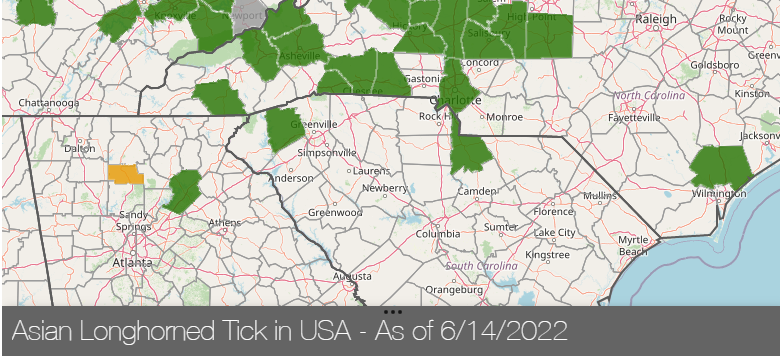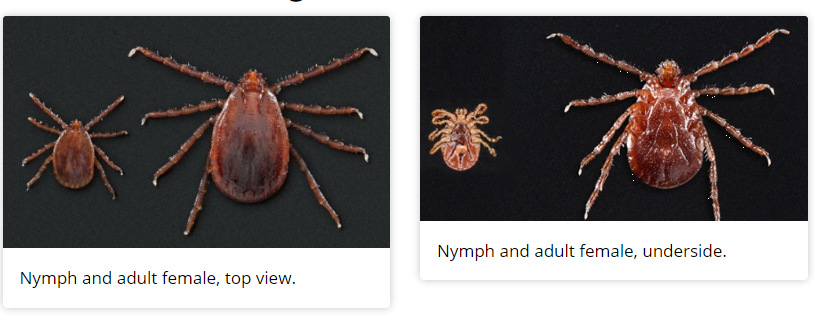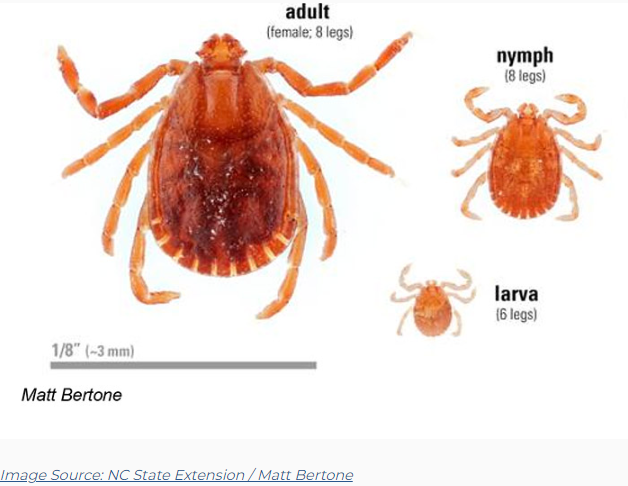A large population of an invasive tick has been identified in a pasture at a cattle farm in York County, S.C.
The Asian longhorned tick is not commonly found in the United States. The South Carolina Department of Health and Environmental Control said bites from the tick have caused severe illness in people, animals and livestock in other countries.
Dr. Linda Bell, state epidemiologist with SCDHEC, said the cluster was found as part of a joint surveillance program her department has with the University of South Carolina Arnold School of Public Health and Clemson University Livestock Poultry Health Department.
MORE: Georgia and South Carolina participate in Operation Southern Slowdown
“We had previously identified a small number of these ticks in 2020 on some shelter dogs in Lancaster and Pickens counties. But the number of ticks recently found on this cattle farm in your county is in the thousands. So, it’s a significant number of ticks,” she said.
The U.S. Department of Agriculture first identified the Asian longhorned ticks in 2010. They have now spread to 17 states, including Georgia.

During a July 11 briefing, Dr. Melissa Nolan, assistant professor of epidemiology in the Arnold School of Public Health and director for the USC Laboratory of Vector-Borne and Zoonotic Diseases, said finding this particular tick in a total of four counties in South Carolina and Georgia indicates it could be distributed in other areas of the two states.
“The reason this is such a big deal, and we are not just working with our three different units within the state but we’re also working with the USDA, is that this tick can replicate very quickly, it undergoes a very unique insect internal process where it doesn’t need a male to reproduce. So, you can get thousands of ticks in one population,” she said, adding the fear is that it could overwhelm livestock, companion animals like dogs and people.
MORE: Locally caught fish is safe to eat, officials say
Although the focus in this specific cluster is on cattle, Dr. Michael Neault, South Carolina State Veterinarian and Director of Clemson University’s Livestock Poultry Health Department, said horses are also susceptible to having ticks.
Aiken County is well-known for its multi-million-dollar equestrian industry. Neault said the most important thing is to monitor horses for ticks.
“Especially coming off of trails from rides and other things on that side right there,” he said. “Right now, we haven’t received a lot of reports that which is good, but we do know that it affects many, many different species of animals. So, horses are on the list that could get it.”
Neault said the assorted permethrin sprays or powders to which horse owners have access can prevent ticks from attaching to the horse. The treatments also help kill the insect or remove them as well.

The good news for dog owners is the flea and tick preventative treatments currently available are as effective against the Asian longhorned tick as against other ticks. However, owners are advised to check their pet, and themselves, if they have walked in woods or bushy areas.
One concern is how easily this tick can spread to other areas. The USDA website said it has been found on an extensive list of wild animals such as white-tailed deer, raccoons and hawks. And as was the case with the discovery of the Asian longhorned tick on shelter dogs in Lancaster and Pickens counties in 2020, there is a concern animals being transported for adoption can spread the ticks into other areas.
“The establishment of the Asian longhorned tick has real animal and human health concerns,” said Nolan. “We are asking the public to send us any ticks they encounter in their everyday lives to help us track and monitor its spread. With local help, I believe we can slow the spread of this tick in our state.”
MORE: Georgia forest fires on decline
To participate in the South Carolina tick surveillance project, DHEC says to collect a tick by using gloved hands, tweezers or another tool. Send collected ticks, alive or dead, in a puncture-resistant sealable vial or zippered storage bag to Laboratory of Vector-Borne and Zoonotic Diseases, 921 Assembly Street 417A Columbia, SC 29201. The sample should include your name and phone number, specific location where the tick was collected, if it was removed from an animal or person and the date it was collected.
In Georgia, if you find an animal with a large number of ticks or an unusual tick infestation, call the Georgia Department of Agriculture Animal Health Section at (404) 656-3667. You can also report your concerns to your local county extension office.
Additional information on the Asian longhorned tick is available on the USDA website: https://www.aphis.usda.gov/aphis/maps/animal-health/asian-longhorned-tick
Dana Lynn McIntyre is a general assignment reporter for The Augusta Press. Reach her at dana@theaugustapress.com











